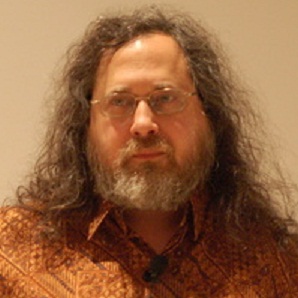

Freedom activist Richard Stallman says eWEEK Europe should not be using Facebook, unless we are using it to bring down tyranny. He also spoke out against mobile phones, praised WikiLeaks and said “cloud computing” was a marketing term designed to confuse, when we met him during a lecture tour of the UK.
The founder of the Free Software Foundation, and the creator of GNU and the GPL licence, widely used for free software, was in London for a lecture (audio file here) at the Institute of Engineering and Technology (IET) on The Free Digital Society. He spoke to us about online privacy and freedom, as well as operating systems and his conflict with the open source movement.
Stallman is viewed by many as a hero, by others as an unrealistic, idealistic figure. We wanted his opinions on issues relating to online freedom and the current uses and abuses of technology. Here is a quick run-down of what we got.
Stallman supports WikiLeaks, despite accusations against Julian Assange: “Even if all the nasty things being said about Assange were true, I would still consider him a hero.”
He also said the “torture” of Bradley Manning, the soldier who allegedly supplied material to WikiLeaks, may be designed to implicate Assange and allow him to be extradited to the US.
He spoke against Facebook, saying in principle no one should use it because “abuse of personal information is Facebook’s business model”. However, since Facebook had a positive role in the Egyptian uprising, he would sanction its use “if you are living in a country with a tyrranical government.”
He told eWEEK Europe in no uncertain terms that the UK government is not tyrannical enough to justify our own use of Facebook – and we should resign jobs which require us to get Facebook fans.
He spoke out against the term “cloud computing”, saying it is spreading confusion and prompting users to give up their freedom to online services. “The term cloud computing is an invitation to think in a sloppy fashion,” he said, adding “marketing buzzwords are not meant to be the basis for clear thinking.”
He also argued against mobile phones: “Twenty years ago, if someone invited you to carry a tracking and eavesdropping device, you would have said absolutely not, and yet you have been lured into carrying one.”
However he is hopeful that a usable phone may be available which uses only free software and does not compromise users’ freedom.
Citizens should protest against laws such as the Digital Economy Act, both by public demonstrations and by running open Wi-Fi networks that will prevent the authorities tracing illegal downloaders, he said.
In the end, his main aim is to eliminate proprietary software, regarding it as an evil akin to slavery. He urged us not to make any compromises by actually using it, and reiterated his arguments against the open source movement, which he says has muddied the water by focusing on quality instead of freedom.
Continued on page 2
Nvidia to partner with TSMC, Foxconn, Wistron, Amkor and SPIL to build $500 billion (£377…
American think tank warns about possible threat to US defence, after China imposes rare earth…
China is reportedly pursuing three alleged US NSA operatives, after cyberattacks on Chinese infrastructure
Chip making giant ASML mirrors other equipment makers, and outlines financial impact of Donald Trump's…
AI is transforming cybersecurity, offering faster defence and smarter attacks. Learn how businesses can harness…
Search engine giant being sued for £5 billion ($6.64 billion) damages over allegations for online…
View Comments
He is my hero
God in disguise form. Avatar of a God. True Legend.
It's sad to see that eweek still supports these bad things even after this interview.